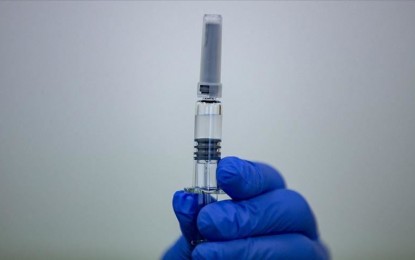
MANILA – Philippine Council for Health Research and Development (PCHRD) executive director Jaime Montoya on Wednesday allayed the public’s concern on the safety of coronavirus disease 2019 (Covid-19) vaccines, saying every vaccine undergoes clinical trials and reviews prior to getting approved and licensed.
"Accelerating the development of vaccine does not mean we are sacrificing quality, much less safety and efficacy," he said during the Laging Handa public briefing.
Science, he said, has a role in ensuring that vaccine development is adhering to the safety standards, and in ensuring that Covid-19 vaccines are safe and effective for humans.
Clinical trials are required to be conducted following ethical requirements, he added.
Montoya said a vaccine pre-licensure requirement involves three phases of clinical trials.
In the pre-clinical phase, he said the scientist administers the vaccine to animals to make sure the vaccine is safe before conducting clinical trials in humans.
During Phase 1 clinical trial, he said the vaccine will be administered to 10 to 100 individuals to test if it is safe for humans.
Under Phase 2, he said the scientist will monitor safety and will determine the optimum dose and schedule in 100 to 1000 individuals.
Phase 3 will involve hundreds or thousands of volunteers and during this level, the efficacy of vaccine in disease prevention will also be evaluated, he added.
With regards to clinical trials, Montoya noted that the government has formed the Task Group on Scientific Evaluation and Selection to review the results of clinical trials. The task group will also review the evidences and international recommendations to ensure the country could choose the best vaccine that is safe and effective.
He also pointed out that the Department of Science and Technology (DOST) has formed a panel of vaccine experts to help in evaluating data obtained from clinical trials.
"Data obtained from clinical trials must show that the vaccine's benefits outweigh the potential risks of recipients of the vaccination," he said.
Only if a vaccine's benefits outweigh its potential risks can a license be granted, allowing the vaccine to be used by the public, Montoya emphasized.
"To ensure the highest scientific standards (are met), the recommendations and results from clinical trials are further evaluated by the FDA (Food and Drug Administration),” he added.
He said the FDA gives the final approval and licenses but does not stop with the approval and licensing.
The FDA will regularly monitor vaccination programs, vaccine manufacturing facilities, and even contract research organizations during clinical trials, to make sure they are following regulations, he added.
Approval from the FDA, he said, is a necessary requirement prior to administering Covid-19 vaccines.
"The vaccines are considered safe to be administered in humans based on safety evaluation studies as part of clinical trials," Montoya said.
Meanwhile, he also noted that every vaccine is being developed differently from one another, and thus may elicit different degrees of efficacy and safety.
As an example, he said one brand may work better for senior citizens, while another brand may work better for children.
"The applicability will depend on the pre-clinical and clinical results of each vaccine. Hence, there is a need to carefully evaluate the available clinical data," Montoya said. (PNA)
